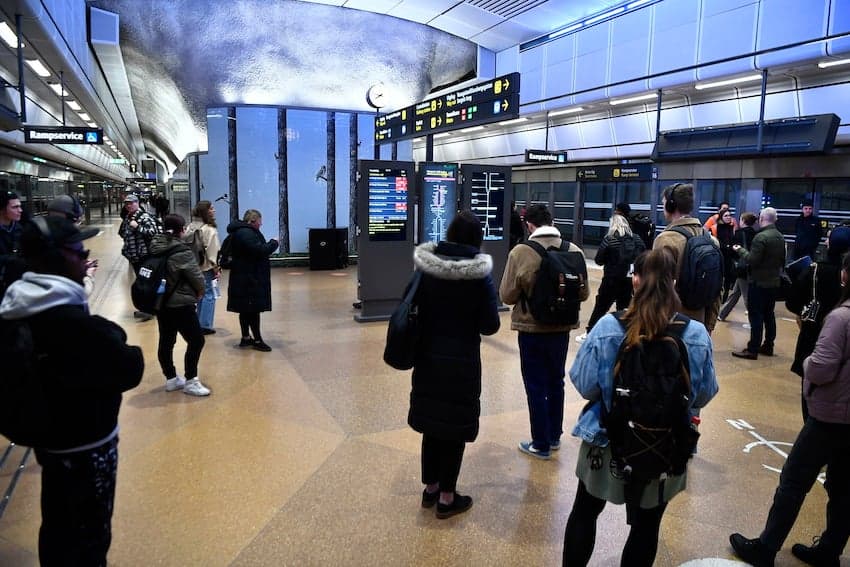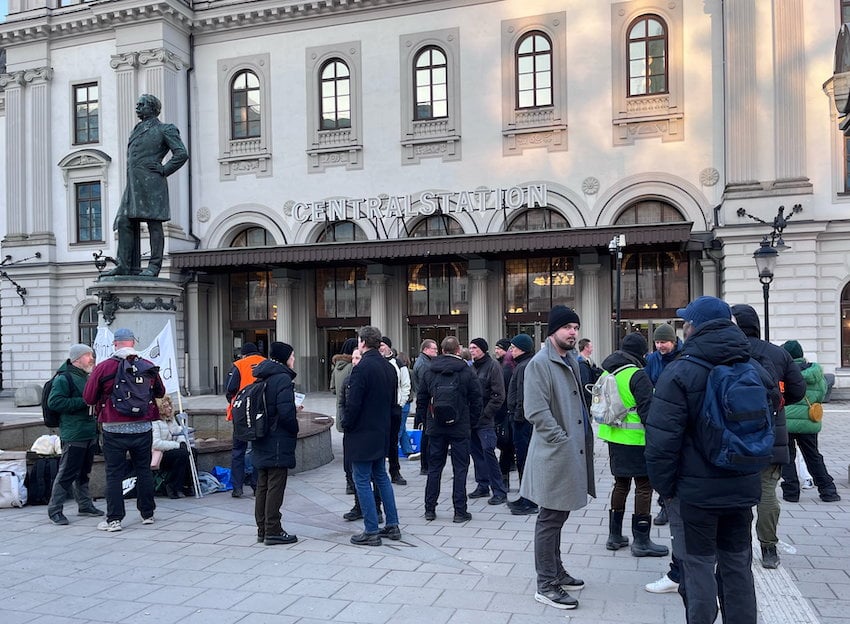Everything you need to know about Stockholm's train strike

Commuters in Stockholm were met by travel chaos on Monday, as only about ten of every fifty trains ran due a wildcat strike. Here's what you need to know about the coming days and how to get compensation.
What happened on Monday morning?
At 3am, a large number of the train drivers working on Stockholm commuter trains launched a wildcat strike in protest at a decision to do away with guards on the trains to check tickets and keep public order.
According to SL, Stockholm's municipal transport organisation, as many as 127 of the 199 trains scheduled to run between 9am and 4pm were cancelled, with disruption expected to continue on Tuesday and Wednesday if SL does not reach a deal with the drivers.
Although SL had replacement buses in place by 6am, there were far too few to meet the demand from stranded commuters.
"It's hard to get enough buses," SL press spokesperson Elin Lindström told the The Local. "To replace a single commuter train requires 25 buses with the number of travellers on board, so it's not possible to get anything close to the same capacity. There aren't enough buses or bus drivers."
She said SL was looking into hiring even more buses on Tuesday.
"Even if we do that it will not make that much difference to commuters, because of the enormous difference in capacity between trains and buses."
What will happen when commuters try to get home this evening?
Lindström said that at 3.30pm, SL still did not yet have a prognosis for how many trains would operate over the evening rush hour, as MTR, the company which operates the commuter trains was still in discussions with the drivers.
"We can't say much about tomorrow, MTR is in dialogue with its personnel, we can expect it to be disrupted, but we have not yet had any information about that."
She recommended that commuters avoid travelling if at all possible. If travelling is unavoidable, she recommended getting a local bus to a Stockholm underground stop, or using trains operated by other operators such as SJ or Mälartrafiken.
If none of those alternatives are possible, she said, travellers could take a taxi and have their costs reimbursed.

Train drivers demonstrated outside Stockholm Central Station on Monday. Photo: Johan Jeppsson / TT
What is the background to the strike?
The decision to strike was taken on Friday at a meeting of 150 train drivers, with the drivers deciding to override their Seko union, which wanted to continue negotiations with Stockholm Regional Council, which owns SL, SL, and MTR, the company which operates the trains and employs the drivers.
The drivers are striking to protest against a decision to do away with the guards on trains who are there to collect tickets, keep public order and help passengers.
"We do not believe that a single Stockholmer would want to sit on a train knowing that there is only one responsible person on board, who in the worst case of an accident might be put out of action from the very start," the drivers wrote on a Facebook page set up for the strike.
"This could be with up to 1,800 travellers, stuck in the middle of the forest with 20km to the nearest station."
The drivers called out to the three regional politicians they blamed for the strike, saying Anton Fendert, the Green Party regional transport councillor, Jens Sjöström from the Social Democrats, and Kristofer Tamsons from the Moderate Party were all "ultimately responsible".
"No one apart from you can stop the strike right now," they said.
Seko, the union representing most of the strikers, has called on its members not to take part in what it called "an illegal action".
In a press release issued on Saturday the union warned that the planned wildcat strike "would hardly make it easy to negotiate" at a time when the union is in active talks with rail transport operators over a new collective bargaining agreement.
Erik Söderberg, head of press at MTR, said that his company had been enacting a decision taken by the regional council, but that its assessment was that driver-only trains could be run without compromising safety.
"It's a political decision and it's our mission to make it happen," he said.
He said that as the strike was not backed by unions, it was hard to assess how many of the company's drivers were taking part. Many more than normal had called in sick, he said, while others had simply not turned up.
"We have had more people than usual sick today and some people didn't give any notice at all so we don't know why they were not at work," he said. "As our train drivers are not informing us about their plans for tomorrow it's hard for us to make a schedule."
What compensation can travellers receive?
SL stressed on Monday that its system of compensation for late or cancelled services was still valid despite the strikes, with Lindström recommending that travellers check the guidelines on its website.
Under SL guidelines, travellers in Stockholm can receive compensation up to 1,315 kronor for the cost of any journey by taxi, another transport company, or even their own car if delays or cancellations of SL services mean they risk being more than 20 minutes late.
If they do travel on an SL service and are more than 20 minutes' late, they can be reimbursed for all or part of the cost of the trip.
You can apply for compensation using this online form or by sending a letter, receipts and tickets marked with a case number to the address below:
Storstockholms Lokaltrafik
20325312
110 30 Stockholm
You must claim the trip within 3 months of the delay in order to receive compensation, and submit the full claim within three years.
Comments
See Also
What happened on Monday morning?
At 3am, a large number of the train drivers working on Stockholm commuter trains launched a wildcat strike in protest at a decision to do away with guards on the trains to check tickets and keep public order.
According to SL, Stockholm's municipal transport organisation, as many as 127 of the 199 trains scheduled to run between 9am and 4pm were cancelled, with disruption expected to continue on Tuesday and Wednesday if SL does not reach a deal with the drivers.
Although SL had replacement buses in place by 6am, there were far too few to meet the demand from stranded commuters.
"It's hard to get enough buses," SL press spokesperson Elin Lindström told the The Local. "To replace a single commuter train requires 25 buses with the number of travellers on board, so it's not possible to get anything close to the same capacity. There aren't enough buses or bus drivers."
She said SL was looking into hiring even more buses on Tuesday.
"Even if we do that it will not make that much difference to commuters, because of the enormous difference in capacity between trains and buses."
What will happen when commuters try to get home this evening?
Lindström said that at 3.30pm, SL still did not yet have a prognosis for how many trains would operate over the evening rush hour, as MTR, the company which operates the commuter trains was still in discussions with the drivers.
"We can't say much about tomorrow, MTR is in dialogue with its personnel, we can expect it to be disrupted, but we have not yet had any information about that."
She recommended that commuters avoid travelling if at all possible. If travelling is unavoidable, she recommended getting a local bus to a Stockholm underground stop, or using trains operated by other operators such as SJ or Mälartrafiken.
If none of those alternatives are possible, she said, travellers could take a taxi and have their costs reimbursed.

What is the background to the strike?
The decision to strike was taken on Friday at a meeting of 150 train drivers, with the drivers deciding to override their Seko union, which wanted to continue negotiations with Stockholm Regional Council, which owns SL, SL, and MTR, the company which operates the trains and employs the drivers.
The drivers are striking to protest against a decision to do away with the guards on trains who are there to collect tickets, keep public order and help passengers.
"We do not believe that a single Stockholmer would want to sit on a train knowing that there is only one responsible person on board, who in the worst case of an accident might be put out of action from the very start," the drivers wrote on a Facebook page set up for the strike.
"This could be with up to 1,800 travellers, stuck in the middle of the forest with 20km to the nearest station."
The drivers called out to the three regional politicians they blamed for the strike, saying Anton Fendert, the Green Party regional transport councillor, Jens Sjöström from the Social Democrats, and Kristofer Tamsons from the Moderate Party were all "ultimately responsible".
"No one apart from you can stop the strike right now," they said.
Seko, the union representing most of the strikers, has called on its members not to take part in what it called "an illegal action".
In a press release issued on Saturday the union warned that the planned wildcat strike "would hardly make it easy to negotiate" at a time when the union is in active talks with rail transport operators over a new collective bargaining agreement.
Erik Söderberg, head of press at MTR, said that his company had been enacting a decision taken by the regional council, but that its assessment was that driver-only trains could be run without compromising safety.
"It's a political decision and it's our mission to make it happen," he said.
He said that as the strike was not backed by unions, it was hard to assess how many of the company's drivers were taking part. Many more than normal had called in sick, he said, while others had simply not turned up.
"We have had more people than usual sick today and some people didn't give any notice at all so we don't know why they were not at work," he said. "As our train drivers are not informing us about their plans for tomorrow it's hard for us to make a schedule."
What compensation can travellers receive?
SL stressed on Monday that its system of compensation for late or cancelled services was still valid despite the strikes, with Lindström recommending that travellers check the guidelines on its website.
Under SL guidelines, travellers in Stockholm can receive compensation up to 1,315 kronor for the cost of any journey by taxi, another transport company, or even their own car if delays or cancellations of SL services mean they risk being more than 20 minutes late.
If they do travel on an SL service and are more than 20 minutes' late, they can be reimbursed for all or part of the cost of the trip.
You can apply for compensation using this online form or by sending a letter, receipts and tickets marked with a case number to the address below:
Storstockholms Lokaltrafik
20325312
110 30 Stockholm
You must claim the trip within 3 months of the delay in order to receive compensation, and submit the full claim within three years.
Join the conversation in our comments section below. Share your own views and experience and if you have a question or suggestion for our journalists then email us at [email protected].
Please keep comments civil, constructive and on topic – and make sure to read our terms of use before getting involved.
Please log in here to leave a comment.